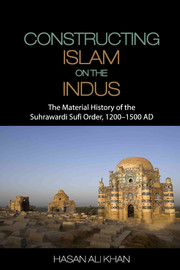Book contents
- Frontmatter
- Dedication
- Contents
- List of Figures
- Foreword
- Preface
- Acknowledgements
- Introduction
- 1 The Suhrawardi Order
- 2 Shams
- 3 The Suhrawardi Order in Uch
- 4 The Wilayat of 'Ali in Twelver Shi'ism, Sufism and the Religion of the Medieval Isma'ilis
- 5 Multan
- 6 The Da'wa and Suhrawardi Monuments at Uch
- Conclusion
- Glossary
- Notes on Referencing
- Bibliography
- Interviews and Fieldwork
- Appendices
- Index
6 - The Da'wa and Suhrawardi Monuments at Uch
Published online by Cambridge University Press: 05 September 2016
- Frontmatter
- Dedication
- Contents
- List of Figures
- Foreword
- Preface
- Acknowledgements
- Introduction
- 1 The Suhrawardi Order
- 2 Shams
- 3 The Suhrawardi Order in Uch
- 4 The Wilayat of 'Ali in Twelver Shi'ism, Sufism and the Religion of the Medieval Isma'ilis
- 5 Multan
- 6 The Da'wa and Suhrawardi Monuments at Uch
- Conclusion
- Glossary
- Notes on Referencing
- Bibliography
- Interviews and Fieldwork
- Appendices
- Index
Summary
Prelude
After Shams's death in 1276, fourteen years after Zakiriyya died (d.1262), there is little evidence of Isma'ili activity under Shams's descendants. Isma'ili sources are quiet on missionary work in Multan after Shams's passing. According to Zawahir Moir, Shams was actually murdered, and did not die a natural death. The narrative makes sense in light of the problems Zakiriyya's own descendants, starting with Sadr al-din 'Arif (d.1285), experienced with the state. The authorities in Multan may have been responsible for Shams's murder, or at least for creating the situation which led to it, as they moved to restrict heterodox groups after Zakiriyya's death. The passing of Shams and Zakiriyya, the two most powerful spiritual personalities in Multan, must have been a great relief to the authorities, especially the 'Ulama, as they reasserted their (religious) control over the city. The general situation forced the Isma'ili da'wa back to the comparative safety of Uch, which is the place from where reports of Isma'ili activity emerge after Pir Shams's death.
This chapter will first establish the presence of Shams's descendants in Uch, who shared the city with the Suhrawardi Order headed by the Bukhari clan, to give the reader an idea of the extent of Isma'ili activity there. Unlike the Suhrawardi Order, the creed of Shams's descendants is neither in question nor hidden. The Isma'ili da'wa in Uch is well researched by scholars, and needs no elaboration. The religious implications of the da'wa in Uch on the activities of Jahangasht and Sayyid Raju have already been explored in Chapter 3. These will become clearer still in this chapter, especially in relevance to the transmission of multi-faith beliefs to the Suhrawardi Order, which are eulogised in the Suhrawardi architecture of Uch.
However, there is a discrepancy in the line of reported Isma'ili pirs in Uch, one that needs to be rectified. The discrepancy is an extra person, alleged to be one of Shams's immediate descendants. The error arose due to a mistake in (the copying of) Isma'ili ginans. Shams's extra descendant, who disturbs both the chronology and the timeline of Isma'ili religious activity in Uch, needs to be explained, to make better sense of the da'wa with respect to the Suhrawardi Order in the city.
- Type
- Chapter
- Information
- Constructing Islam on the IndusThe Material History of the Suhrawardi Sufi Order, 1200–1500 AD, pp. 199 - 244Publisher: Cambridge University PressPrint publication year: 2015
- 1
- Cited by



